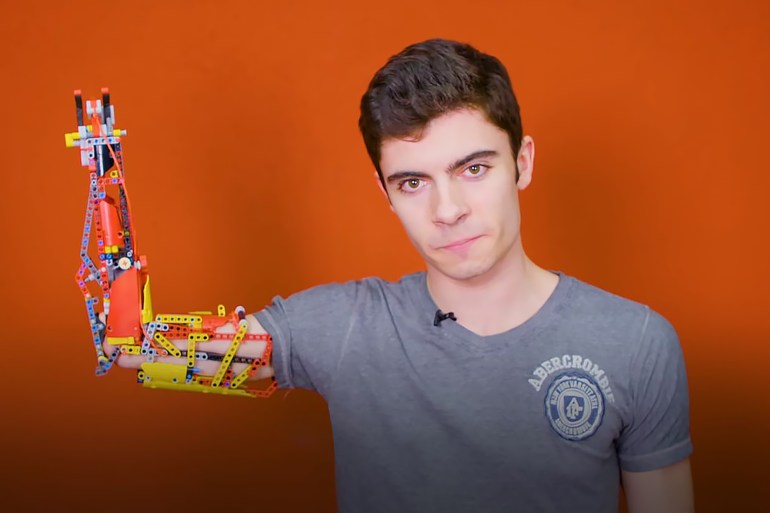David Aguilar was five years old when he discovered 'Ligo' toys that became a haven against ridicule about his disability.
Today, when he has become a young man, he has fulfilled his dream of making another child benefit from what he makes.
David, 22, suffers from Poland's syndrome and was born without a right forearm.
But this rare congenital deformity did not hinder his life, but on the contrary, it was a stimulus to his ambition and a source of livelihood.
This Andorran student, who has admired robots since he was a child, has little spare time, as he is about to complete his training in bioengineering, gives lectures on motivation, has published a book, and participated in the LEGO Masters program on The French channel M6, he was even among the speakers at a conference on innovation organized by the US space agency "NASA".
His facial features constrict as he recalls the years when Lego was also a refuge for him.
At his university residence near Barcelona in northeastern Spain, David recounts that, "When I was a teenager, I kept playing in Baligo because it was a way to forget about harassment, and it helped me a lot in ignoring the sarcasm."
During these difficult years, when he was 17, David designed a more precise prosthesis that for the first time allowed him to perform push-ups with both arms.
“Since I made my first prosthesis, I realized that I had the power to help others, and when I saw myself in the mirror with two arms (thanks to the prosthesis), I felt that others really needed it.” — David Aguilar
David arrived today in the fifth version of his prosthetic, called the MK 5, which is a robotic-looking LEGO arm with blue rods at the tip that act as fingers that David activates with the movement of his torso thanks to a system of robotic pulleys.
Although David is used to living without his right forearm, and therefore does not use it daily, he knows that many people have a dire need to have a prosthesis that could cost thousands of dollars if it was a newer generation.
David took the initiative to create his YouTube channel and called himself "Hand Solo" (communication sites)
"Since I made my first prosthesis, I realized that I had the power to help others, and when I saw myself in the mirror with two arms (thanks to the prosthesis) I felt that others really needed it," he says.
Prosthetic limb for baby Biknor without arms
David then created his YouTube channel and called himself "hand solo" in a word game based on the word "hand" (meaning "hand" in English) and inspired by the character of "Han Solo" ( Han Sol) in the "Star Wars" movie series.
Soon, the story of the young man spread and became cross-border.
A few months ago, he received a letter from Zauri Bektimisova who wrote to him because her 8-year-old son, Biknor, who was born without arms, could not get a conventional prosthesis.
"The prosthetics are mostly big and heavy, and this is not good for the spine," explains the Kazakh, who has lived in Strasbourg for two years, where her husband is a diplomat at the Consulate General of Kazakhstan.
"Now I can pick up things I couldn't carry before"
David promised her to try and build a prosthetic for Becknor.
At the end of last August, the little boy and his mother went to Andorra to try out this lightweight prosthetic that ends in a clip that Picknor controls thanks to a rope attached to his left foot.
"Now I can pick up things I couldn't carry before," adds Becknor, who is now able to throw the ball to his brother or hold a small computer.
In fact, it's just a few small pieces that changed David's life.
Zawry notes that "his confidence has grown."
In David's mind, projects are crowded.
He asks himself, "If I did it for Becknor, why wouldn't I repeat it to a boy or girl without a leg?"

